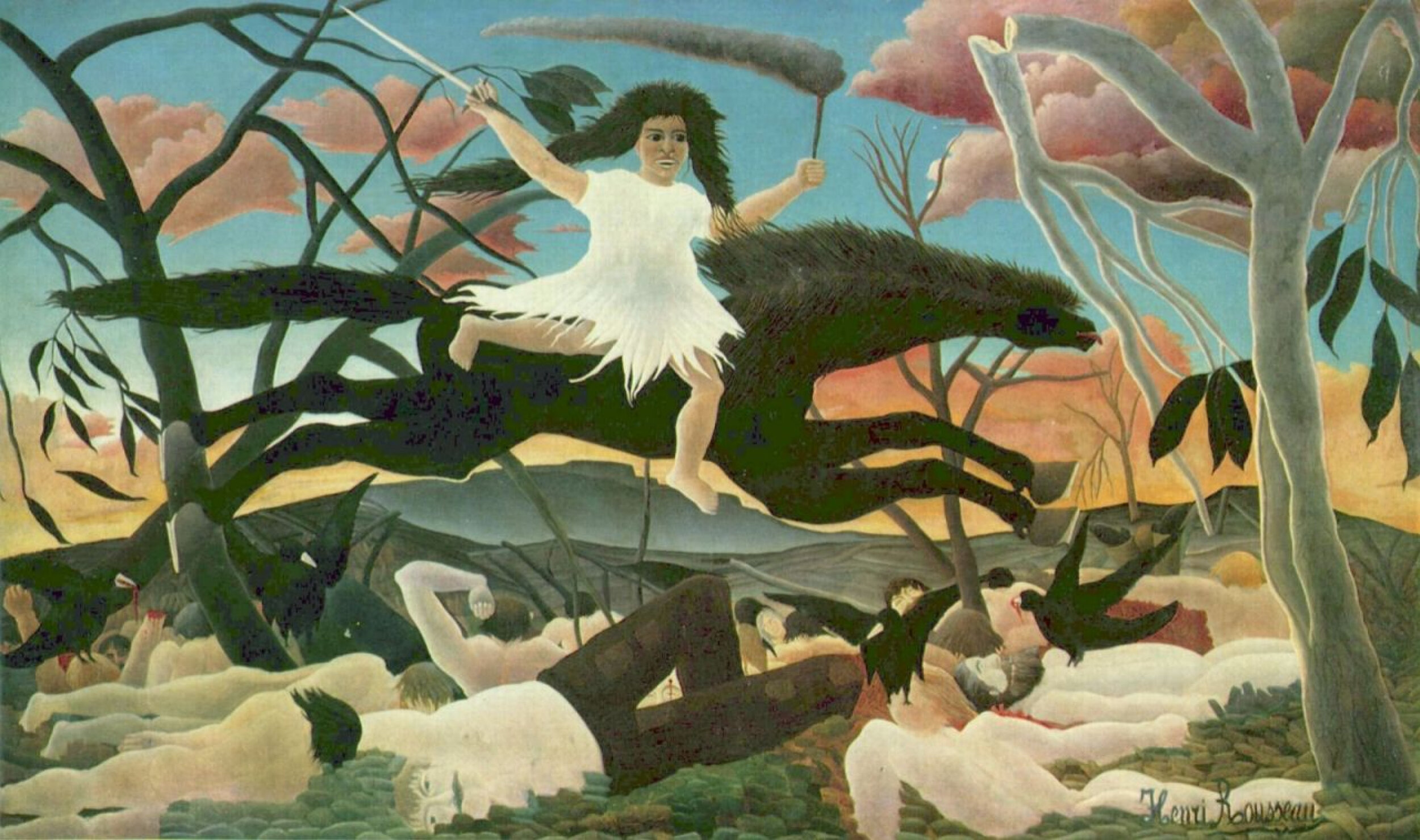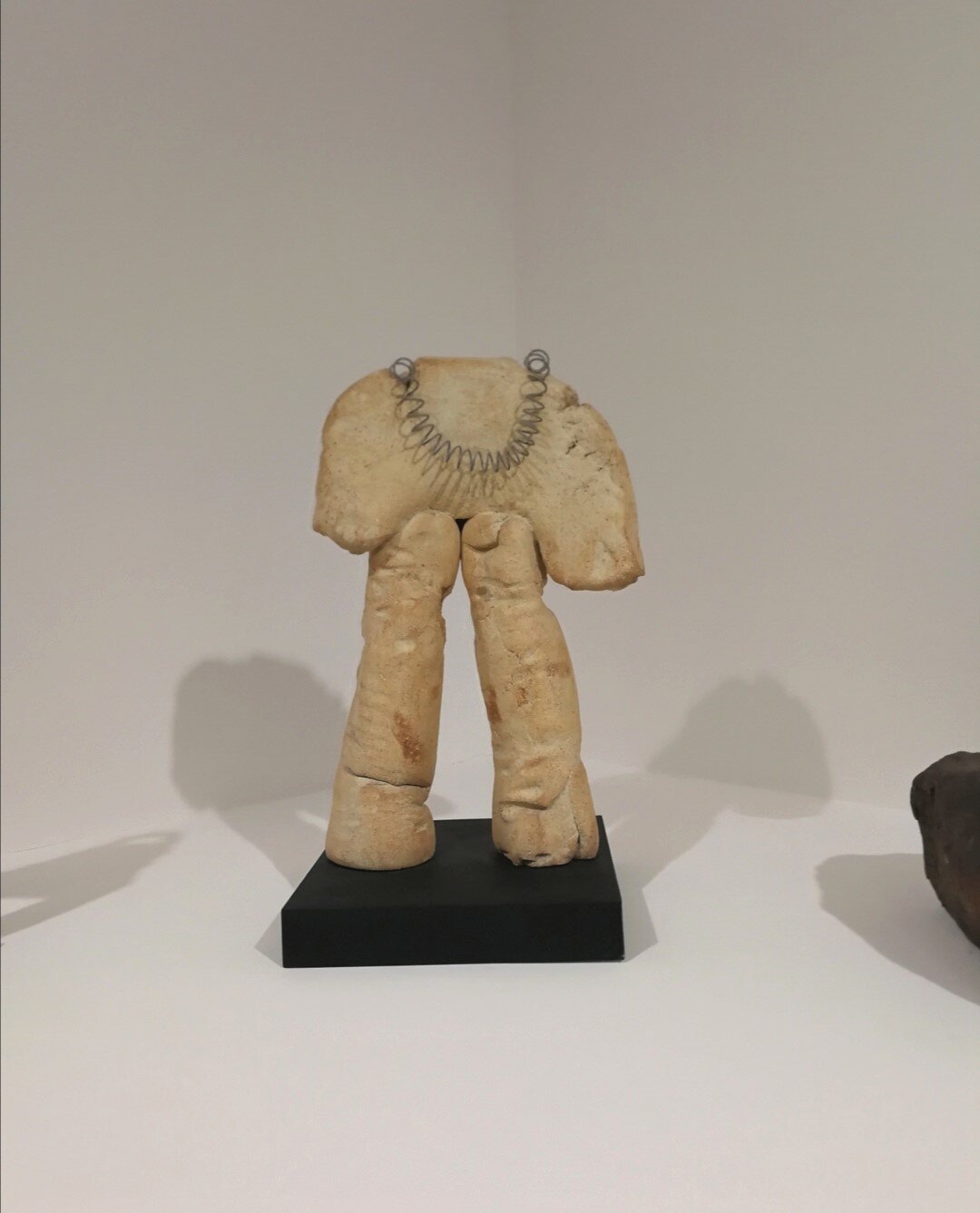Text - Ideas as art is boring Marcel. nov 2019
La Bohémienne endormie, 1897, Henri Rousseau
Last week I saw the French documentary Le dounier Rousseau ou l’éclosion modern about Henri Rousseau (1844-1910) by Nicolas Autheman. It touched upon something I have been feeling, thinking and reading about lately, connected to my work with myths and the search for something beyond the conscious reasoning, why I have gone back to image making - painting, drawing.
I didn’t know much about Rousseau from before. I have a distant memory from some art history lesson, and I saw a jungle picture this summer at the Metropolitan that I really liked. He was self-taught. His father was an iron monger and had no means to support his education so he taught himself, on the side of his work as a custom official. He was recognised only after his death, though he was admired by contemporary artists like Picasso, Apollinaire and later also by surrealists Dali and Magritte for his ‘naïve’, flat paintings, that was laughed at by the general public. Though, according to the moviemaker, they are not naïve, but rather a conscious move towards the unconscious, and at the same time a way to cleverly dodge his lack of technique?
In the movie they make a connection between Rousseau’s more abstract realism to the type of symbolic art that you find in medieval churches. There was one of them in Laval where Rousseau grew up, where he supposedly got a lot of his inspiration for his later work. The medieval art “didn’t have to be realistic to be real” as they explain in the movie since it where made in a “time where you had to believe to see”. It was art with a different function than the realistic one. It didn’t seek to portray the world with accuracy, but was expressing something else. It was trying to reach beyond the physical world we see with our eyes. A world beyond the one on earth, in biblical terms i giess heaven and hell. Rousseau also explored an unknown world that you also had to “believe to see” or feel to see, an inner landscape - imagined jungles with psychological implications. Which was a path other western contemporary artist soon would follow. One reason was, also mentioned in the movie, the entrance of the film and the photography that was becoming more common in the beginning of the 1900’s. Why paint realistic when there was a media that could do imitate it perfectly? Another push to explore other worlds and thinking beyond the reason was the disappointment of the industrial world after the first world war.
Also today there seems to be an thirst for meaning and a new way of thinking, connected to the realisation of the flawed capitalist project, a heating climate, the mass extinction of other species but also because of more individual problems like stress or a fatigue of the consumption society. The Swedish philosopher Jonna Bornemark is one that brings this on the table with her book Det omätbaras renässans: En uppgörelse med pedanternas världsherravälde where she critics what she calls our ‘contemporary measurement society’. She uses renaissance thinkers Nicholas Cusanus (1401 – 1464) Giordano Bruno (1548 - 1600) and René Descartes (1596 – 1650) to describe our contemporary society as a society where we try to measure the unmeasurable.
Central in the book are Cusanus notions related to our thinking: Intellectus, ratio and the unknowing. In short Ratio represents our discursive reason ‘the strictly rational and measuring side of our conscious’. Intellectus is an analytical competence, a direct intellectual vision designating the situation-specific, the subjective and the emotional experience. Knowledge based on experience. Both ratio and intellectus is necessary for our thinking. The problem today argues Bornemark is that ratio has in many aspects become dominant in our ‘evidence-based society’ giving intellectus a marginalised position. ‘The evidence-based model strives towards a certain kind of knowledge that assume that science is made from a neutral position and search for value- free facts. Which is necessary within parts of natural-sciences but not so convenient when it comes to complex practices such as politics, education or the arts. She means that this development is a result of a too big reliance on a calculating reason that you can find within scientism movements, an over-reliance in our capability to control all aspects of life and a demand for economical efficacy within all areas in society. One of the implications of this measurement society can you find within the school and health care. Institutions that have increasingly come to be about documenting the doing for the sake of ‘quality assurance’, efficiency and ‘management by objectives’. In reality giving the teachers, nurses and doctors less time (because of the administrational burden) to focus on their core tasks - to teach and take care of the patients. You can see it within the art education as well, cut downs and more demands of documentation of what students can and do, gives less resources for meetings, conversation and making. Also, the big questions, impossible to learn antything about through statistics, have gotten less space in our secular society. Central questions we will most likely never be able to answer or understand fully like death, the eternal, love or beauty. Cusanus unknowing.
When Rousseau explored his inner unknown landscape he used intellectus (and his male, western perspective - seeing the jungle as the ultimate unknown). He wanted to go beyond the material world, to make images not of what he saw but what he imagined. Jonna Bornemark is arguing not that we shouldn’t trust ratio but that we also have to take seriously situation-based abstract knowledge impossible to measure that approach abstract questions we will probably never get the ‘right’ answer to, worlds we can only imagine like other subjectivities than the human. What does trees think?
I have felt an urge to involve my body and let my intuition and coincidence gain a bigger place in my work. I hoping painting will help me to connect body and mind and to lose control. Coz I’m tired of Duchamp-sk art where you need to read all the notes to “get it”, where you calculate your next move. Jonna Bornemark says in a Youtube video about intellectus (and cityplanning?) “What is the important aspects within city planning? Is it to simply calculate how we get the best city or is it about an ability to not really know, to be open for a future that could develop in many different ways’ (my translation).
The ability not to really know is also an ability. and it’s harder than it sounds.
Met Cloister
War (rider of discord), 1884, Henri Rousseau
Guernica, 1937, Pablo Picasso
Virgin Mary, Met Cloister.
Woman with necklace, 2011, Simone Fattal, MOMA PS1
Man with the collar, 2008, Simone Fattal, MOMA, PS1
The house with a hole in the ceiling, 2006, Simone Fattal, PS1







